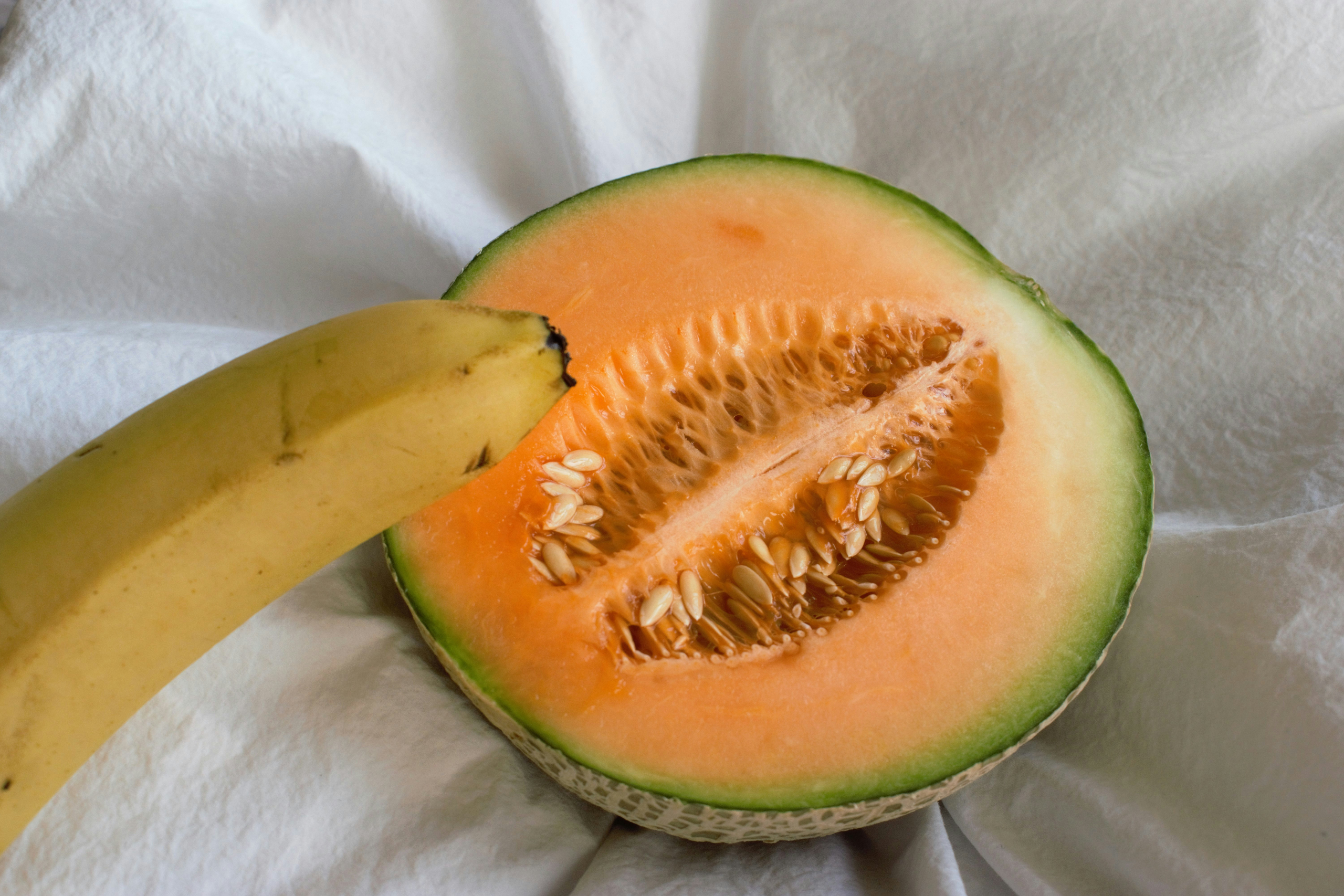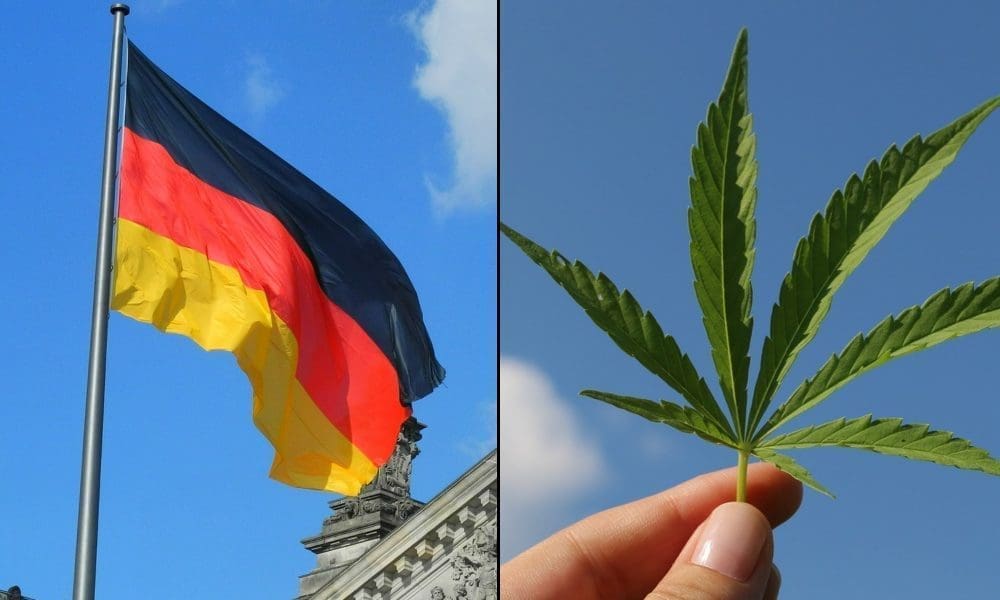featured
Does Weed Make Sex Better? Science Says ‘Ohhhh, Yeah’
Published
3 days agoon

Cannabis enhances all sensory perception, and yes, that includes boinking, bumping uglies, knocking boots, or whatever you want to call it. Don’t look at me: science says so.
Less aggressive, more sensitive and present, a booster of orgasms and, overall, a great ally for steamy moments in company or solo. Not always (but often), weed has proven to be a key ingredient when things get a little bit raunchy.
If you’re the type who, after a few hits (or edibles, whatever rocks your boat) starts feeling cuddly or a little flirty, and thinks “this hits different…”, good news: it’s not your imagination. You’re not alone, and it’s definitely not just you. It’s the weed. And yes, science’s got your back.
Pleasure —in almost every form— has been criminalized, stigmatized, and policed for centuries, especially when it’s intentional. And nothing brings those tensions to the surface like sex and weed: two deeply personal, but still taboo experiences.
So let’s get down to business, because science, sex, and weed are overdue for a threesome.
Does weed make you feel sexier?
Tricky question. Sex is already a wildly subjective experience. When you throw weed into the mix, things can go either way: from divine to pure hell.
For some, cannabis turns every sensorial experience up a notch: confidence, comfort, sensuality. Skin feels electric. Eye contact lingers. You feel hot, wanted, magnetic. For others? Not so much. Anxiety creeps in, mouths go dry, and suddenly you’re wondering if you left the oven on mid-makeout.
It’s all about set, setting, and knowing your strain.
Some people say cannabis makes everything slower, wetter, deeper, louder. Others feel distracted, sleepy, or self-conscious. And that makes sense. Your high is shaped by so many variables: the dose, the strain, your tolerance, your mood, your hormones, the way your body metabolizes cannabinoids, even (and especially) the vibe of the person next to you.
According to Dr. Damián Cantaloube, a physician and specialist in endocannabinology, weed can help you feel more at ease and open during intimacy: “Cannabis can make you feel relaxed or help drop inhibitions, which may relate to feeling ‘sexier’.” Still, he cautions that not everyone will get the same glow-up from lighting up: “These effects can vary widely, and not everyone will experience an increased sense of personal attractiveness from cannabis use.”
That volatility is echoed by Martín Rieznik, author and TEDx speaker focused on the science of seduction: “Speaking with friends about this, we all agree that sometimes weed enhances connection, relaxation, and pleasure with others—but other times it does the opposite: inhibition, insecurity, difficulty expressing yourself, nervousness, and paranoia.”
In other words, weed might make you feel like a sex god—or it might make you want to crawl under the sheets alone. And that’s okay. The way cannabis plays with confidence, comfort, and arousal is as personal as your playlist.
The thing is, people are clearly thinking about this. And searching. A lot. Google searches for “CBD for sex” and “marijuana for sex” have surged by 238% and 162% respectively.
So, popular opinion? Check. But, what does science say?
high + horny: a scientific overview
When we think “science,” we usually picture lab coats, beakers, and controlled experiments. But in the world of cannabis and sex, science often looks like something far more intimate: asking people how they feel—and actually listening to them.
Because of legal restrictions and ethical limitations, many studies in this area rely on self-reported, anecdotal experiences rather than lab-controlled data. However, that’s not a flaw, it’s part of the human science of pleasure. And according to those experiences, the verdict is pretty clear: yes, cannabis and sex are vibing. Touch feels touchier. Kisses, wetter. And moans? Louder.
Jonathan Bohun, CEO of cannabis tech company WEEDAR, puts it like this: “Studies show that 70% of people experience higher sexual desire and more intense orgasms when cannabis is involved.” He adds, “the music sounds better, food tastes better, and sex feels better.”
Backing that up with fresh data, a 2025 study by Kayla M. Mooney, a PhD candidate at Queen’s University in Canada, conducted two studies:
- An online survey of 1,547 cannabis users
- A 28-day diary from 115 participants, most of whom used cannabis regularly
She found that “More frequent cannabis use was linked with greater daily sexual desire.” Also, “on sexual activity days, participants reported significantly higher sexual desire and arousal on days they used cannabis compared to non-use days.”
Last, but not least: “across all study days, participants reported significantly higher sexual desire and lower sexual distress on days they used cannabis compared to non-use days.”
Roughly half of the survey participants even admitted they use cannabis specifically to enhance their arousal.
So, yeah, science is right there screaming “Ohhhh, yeah” with you.
It’s not just what, it’s the way, the why, the how, even the where…
But there’s more. A 2022 survey by Goldleaf and The Intimacy Journal writer, Sophie Saint Thomas, dug into exactly how and why people mix weed with sex. They asked 200 sexually active cannabis users from all identities and preferences. The results? A love letter to plant-based pleasure.
Among the favorite ways people use weed before sex, the survey found that:
- 34% smoked it
- 25% went for edibles or drinks
- 19% vaped
- Others used dabs, topicals, sublinguals—even mucosal methods.
About the preferred dosage:
- 35% liked medium-high doses
- 27% preferred medium
- Only 6% microdosed
- 19% went all-in with very high doses
And why do they do it?
- 35% said greater sexual pleasure
- 18% wanted more intimacy and connection
- Others cited relaxation, reduced anxiety, better orgasms, boosted libido, and performance
Even location played a role: 82% preferred getting it on at home, 44% specifically in the bedroom, and 1% confessed to public hookups while high. Naughty, naughty.
And then there’s the big data: a study published by Stanford University in the Journal of Sexual Medicine reviewed responses from over 50,000 Americans. It found that women who used cannabis daily had sex 7 times per month vs. 6 times for non-users. Men showed a similar trend—7 vs. 5.
Of course, not everyone buys into self-reported data. As Martín Rieznik warned: “These surveys are biased. People who report positive experiences are usually those who already enjoy how it hits.”
We’ve mentioned the bedroom, but what happens in the lab?
While rare, there are clinical studies that dive into the physical side of cannabis and sex. Researchers have taken into account that:
- THC and CBD are vasodilators — molecules that actively expand blood vessels and improve circulation
- Devices like vaginal photoplethysmographs to measure internal arousal
Scientists have long suspected that the body’s natural endocannabinoid system plays a role in sexual pleasure.
One study published in The Journal of Sexual Medicine measured levels of natural endocannabinoids (such as anandamide, also known as “the happiness molecule”) in women before and after watching erotic films. As women became more aroused, their endocannabinoid levels dropped, a sign that the system was actively responding to sexual stimuli.
Why does it matter? Because THC, the main psychoactive compound in cannabis, mimics those naturally produced chemicals. So, when people say that weed makes sex better, they may literally be activating the same system the body uses during arousal.
These experiments suggest cannabis may enhance physical readiness for sex, especially in people dealing with anxiety, pain, or low desire. But just like all-things weed, the outcome depends on dose, strain, body chemistry, and mood.
Is it subjective? Totally. But is it scientific? Also. Because sensations—when repeated across thousands of people, documented, analyzed, and echoed in study after study—are data.
Weed vs. wine: Who’s a better lover?
A study published in the Archives of Sexual Behavior found that most people preferred having sex while high over being drunk. And it’s not hard to see why.
As sexologist Nick Karras puts it: “Unlike alcohol, which dulls the senses, cannabis enhances awareness.” While alcohol can make you bold and daring, it often pulls you out of your body, numbing sensations, blurring memories, and sometimes leading to regret. Weed, on the other hand, tends to tune you in.
Cannabis encourages presence, intimacy, and attunement. It helps many people stay focused on their partner, tap into tactile sensations, and avoid the kind of poor judgment or emotional distance that alcohol can induce. It’s also worth noting that alcohol is strongly linked to male sexual dysfunction and aggression—both intimacy killers. Cannabis? Not so much.
So, in short: cannabis helps you connect, while alcohol helps you escape—sometimes a little too far. But let’s be real: weed can send you drifting too, if you’re not careful. That’s why dose is everything.
Dosing is also foreplay
When it comes to weed and sex, less might be more. In fact, the difference between a sensual high and a mental spiral could just be one puff away. As sexologist Francesca Gnecchi explains, a small dose can enhance intimacy, but too much might take you out of the moment, just like alcohol. “A little disinhibits you, but too much isn’t helpful. And with cannabis, it’s the same. Depending on the amount used, it can help—or not.”, she says.
Research backs her up. Lower doses of THC have been linked to enhanced sexual desire and pleasure, while higher doses can cause anxiety, dissociation, or just plain zoning out. So, starting slow is always the best option. One puff and you can be a sex wizard. Eight in a row, and you’re worrying about your taxes.
So tread with caution: there’s always time for another toke. Also, high doses can blur boundaries if you’re not careful. And there’s nothing sexy about blurred boundaries. Gnecchi says: “If we’re under the influence of any drug that makes it hard to give explicit consent—or if the other person isn’t fully lucid—it’s best not to have sex.”
Feeling good is not inherently being in the right state of mind. If you’re too high to articulate your needs or listen to your partner, it’s a clear sign to pause. Consent must be enthusiastic and explicit—before, during, and after.
As a pro tip, try flying solo first. Masturbation while high helps you understand your own responses, so you’re better equipped if and when you share the experience with someone else.
Solo sessions can’t be left out of the convo
Now, let’s focus on why riding the love-train alone is just as important as taking a trip together.
Ashley Manta, sex coach and creator of the term Cannasexual, preaches the gospel of intentional self-pleasure + weed. Her approach is all about slowing down, being present, and reclaiming pleasure as something powerful—not shameful.
To set the scene, she suggests creating a sensual space: light some candles, press play on your sexiest playlist, and explore your body with curiosity, not pressure. And if you’re feeling adventurous, you can even try applying CBD oil directly to your genitals—just make sure it’s made with a safe carrier oil like coconut. Wait about 20 minutes after applying before diving in and notice how your body responds. This is about tuning in, not zoning out.
“Any time something is deeply stigmatized, I ask—who benefits from that shame?” Ashley says. Pleasure isn’t shameful. It’s a radical act of care. And here, as well, weed can be a great ally.
CBD between the sheets
From lubricants to massage oils, CBD-infused intimacy products are no longer niche; they’re everywhere, and they actually work.
Both THC and CBD are vasodilators, meaning they increase blood flow and sensitivity. When applied directly to the genitals (such as clitoral and vaginal use), CBD can help boost natural lubrication, enhance sensation, and create a deeper sense of body bliss—all without the head high.
As Gnecchi explains: “It produces a warming sensation, and depending on the person, may help intensify orgasm.” This is also backed by science. As Bohun puts it: “Our intimate zones have cannabinoid receptors. CBD enhances sensitivity and pleasure.”
Whether accompanied or alone, CBD in between the sheets might just be your new favorite ritual.
Cannabis is not a cure-all solution, but it can help
Let’s get one thing straight: weed is not a magic potion. It won’t fix a broken relationship, spark instant chemistry, or do the emotional heavy lifting for you. Good sex still requires trust, communication, presence, and respect -and that load is on you.
But it can help you tap into your body. It can quiet down the noise in your head and make you feel more comfortable in your own skin. So, when used intentionally, it can be a powerful tool, but, just like a hammer, it could be dangerous in the wrong hands.
So, TLDR: if you’re curious, take it slow. Tune with your body. Be honest with your needs. Try solo sessions. Talk to your partner(s). Start low, go slow, and always, always, get consent.
Pleasure is sacred, and if weed helps you unlock that? Then, come on, baby. Light my fire.
Photo by Martin Moore on Unsplash

Author: mscannabiz.com
MScannaBIZ for all you Mississippi Cannabis News and Information.
You may like
-


The DEA’s New Boss Holds the Keys to Weed Reform: Will He Take Action?
-


Former Erie Co. Home To Cannabis Growth Site?
-


New German Medical Cannabis Restrictions Will Harm Patients And Hinder Industry Growth (Op-Ed)
-


New Survey: 9 in 10 Americans Want Decontaminated Cannabis
-
Dream Of Working In Weed? This Scholarship Could Make It Happen
-


Cresco Labs Exiting California Market as Part of ‘Strategic Restructuring’
featured
The DEA’s New Boss Holds the Keys to Weed Reform: Will He Take Action?
Published
10 minutes agoon
July 24, 2025
After months of silence and bureaucratic stalling, the DEA finally has a new boss: Terrance Cole, confirmed by the Senate earlier this week.
That might not sound like major weed news since it’s the DEA and all, but it is. The federal effort to reschedule cannabis — perhaps the biggest shift in US drug policy in over half a century — now flows directly through him.
Let’s break it down: Cannabis is still a Schedule I substance under federal law, the same category as heroin and LSD, meaning the government officially considers it to have no medical value and a high potential for abuse. Yes, even in 2025, after nearly half of the U.S. states have legalized cannabis for adults to buy and consume.
Rescheduling to Schedule III, alongside Tylenol with codeine and anabolic steroids, wouldn’t legalize cannabis outright. But it would mark the biggest federal policy shift since the Nixon Administration launched the War on Drugs in 1970.
Cole told lawmakers prior to his confirmation that advancing the rescheduling process, initiated by the Biden Administration but since stalled under President Trump, is one of his top priorities.
That’s the good news.
The not-so-good? He has a long track record of anti-cannabis statements and refused to give direct answers about what outcome he wants for the process. He’s playing it close to the chest.
Then came a twist: Just one day after Cole’s confirmation, the DEA’s administrative law judge overseeing the rescheduling process, John Mulrooney, announced his retirement. In a letter, he said all matters now go straight to the DEA Administrator. That’s Cole.
The cannabis industry is cautiously spinning Cole’s appointment as a win. That’s mostly because it’s been starving for any federal progress. Hearings were supposed to begin in January but quickly got bogged down by procedural fights, witness disputes, and a general lack of urgency.
So now, he has two choices:
- Finalize the rescheduling recommendation and jam it through himself — unlikely, but possible.
- Appoint a new judge and restart hearings from scratch. That would mean more delays and more dysfunction. More on that below.
If rescheduling happens, the implications are massive, especially for cannabis businesses.
The biggest shift? Eliminating IRS Code 280E, a tax rule that bars cannabis operators from deducting normal expenses like payroll, rent, and office supplies. That rule has gutted balance sheets and pushed even profitable companies into the red.
Rescheduling could also unlock access to banking, ease mergers and acquisitions, and possibly even allow U.S. cannabis firms to list on major stock exchanges — though it’s unclear if Nasdaq or NYSE would permit that under Schedule III.
For social equity operators, it could be a lifeline. States like New York and Illinois established these licensing programs to give entrepreneurs harmed by the War on Drugs a first crack at the newly legal market. But the lack of federal reform and banking access has left many undercapitalized, buried in debt, and unable to open. New investment and lower capital costs could give them some breathing room.
But here’s the rub: Many grassroots advocates worry Schedule III could cement the dominance of deep-pocketed multistate operators like Curaleaf and Green Thumb Industries that cultivate and sell cannabis in multiple states. These companies already have the compliance teams, legal firepower, and capital to navigate federal ambiguity — and now, potentially, tax relief too.
Rescheduling doesn’t legalize cannabis. It doesn’t expunge records. And it technically wouldn’t stop federal agencies from hassling state-legal operators if they wanted to. It just makes the math easier — for the businesses that are already surviving.
Trump has political reasons to move on cannabis reform. He backed rescheduling during the campaign — meaning it would be a fulfilled campaign promise — and it could distract from Epstein file fallout and DOJ scandals. More importantly, he’s hemorrhaging Gen Z support, and they overwhelmingly back cannabis reform.
It also gives Trump a way to split the difference in his big-tent party. It’s not full legalization (which could trigger backlash from the religious Ron DeSantis/Mike Johnson wing), but it is a policy win that helps small American businesses, plays well with young voters, and looks like reform and a broadly popular issue without going all the way.
It’s a politically useful half-measure. But in this administration, it might be the best we get. Now that Judge Mulrooney’s out, the ball is squarely in Cole’s court.
Will he push it through? Or slow-walk it into oblivion? The industry’s watching. Closely.
Editor’s note: Check out more of Jeremy’s work over at Cultivated — one of our favorite sources for smart, nuanced cannabis coverage.
Photo by Thom Milkovic on Unsplash

Author: mscannabiz.com
MScannaBIZ for all you Mississippi Cannabis News and Information.
featured
New German Medical Cannabis Restrictions Will Harm Patients And Hinder Industry Growth (Op-Ed)
Published
1 hour agoon
July 24, 2025
“Despite significant and stable market growth, certain proposed policy changes that have been drafted may hinder industry progress and restrict patient access.”
By Niklas Kouparanis, Bloomwell Group
A new threat looms over the burgeoning medical cannabis market in Germany.
Recently, the German Health Ministry released a draft amendment that would require patients to have an in-person consultation annually and would bar prescriptions from being delivered by mail. While this is a draft and is likely to be changed during the legislative process, many are questioning the potential effects of policies like these on an otherwise growing and stable market.
Will this stall or even curtail future success?
Where the German medical cannabis market currently stands
Since the passage of the Cannabis Act (CanG) in April 2024, Germany has experienced significant growth in the country’s medical cannabis market due to cannabis being reclassified cannabis as a non-narcotic. This removed unnecessary administrative burdens on the medical cannabis market and allowed more patients to access the plant as a wellness treatment.
Prior to CanG being implemented last year, there were an estimated 200,000 to 300,000 medical cannabis patients in the German market. As of May 2025—just over one year after CanG went into effect—Whitney Economics estimates that there are now an additional 500,000 to 600,000 patients participating in the legalized self-paying market.
I predict that we could soon see a million patients if the market can grow under its current regulatory conditions.
As reported by the Federal Institute for Drugs and Medical Devices (BfArM), Germany imported over 37.223 metric tonnes of medical cannabis products in the first quarter of 2025. This number represents a noteworthy increase as the total imports for Q1 2025 increased by roughly 14.8 percent compared to the Q4 2024 total (32.419 metric tonnes). Compared to the same period a year prior, the Q1 2025 import numbers represent an increase of over 457 percent.
Proposed changes seek to put patient access at risk
Despite significant and stable market growth, certain proposed policy changes that have been drafted may hinder industry progress and restrict patient access.
In July 2025, the German Health Ministry released a draft amendment that would require patients to have an in-person consultation at a physician’s office or during a home visit once a year to be prescribed medical cannabis and also as a first step before starting their therapy.
In addition, medical cannabis treatments would no longer be able to be delivered by mail order. Patients would have to pick up their treatments at physical pharmacy locations.
Such legislative changes to current German cannabis law are led under the direction of Federal Health Minister Nina Warken, who is seeking to restrict patient access to medical cannabis. Warken has emphasized that record-high cannabis imports have increased beyond what was anticipated.
Report Reveals Digital Access Restrictions Would Push Patients to Illicit Market
According to German medical cannabis company Bloomwell Group’s latest report, “The Cannabis Barometer–Potential Consequences of Restricted Telemedicine Access,” which surveyed 2,500 medical cannabis patients in Germany, 41.7 percent of patients would revert to the illicit market if digital access were blocked.
Such findings suggest that digital access to licensed, physician-supervised cannabis therapy has successfully transitioned hundreds of thousands of patients away from unsafe, unregulated sources and into safe, pharmacy-distributed care.
Additionally, Bloomwell found that medical cannabis patient numbers show no signs of slowing down: In May and June 2025, the number of prescriptions filled on the company’s digital platform exceeded those from March 2024—the final month before medical cannabis was reclassified—by more than 1,100 percent, a new record high.
Other key findings from the Cannabis Barometer report included:
- Only 7 percent would consider joining one of Germany’s legal cannabis clubs, which mainly serve recreational users.
- Seventy-nine percent of patients previously relied on unlicensed sources (illegal market and/or through friends and acquaintances) before accessing digital therapy.
- Forty-seven and a half percent now say cannabis obtained from pharmacies is less expensive than unlicensed products, debunking myths about affordability. Only 13.8 percent responded that pharmacy cannabis is more expensive.
- Eighty-three percent believe medical cannabis from pharmacies is of higher quality than illicit alternatives.
Public and safety benefits of digital access
As mentioned, the passage of CanG allowed for further patient access to the legalized medical cannabis system. Such access prompted some individuals to shift from the illicit market to the regulated medical system, as they could now access prescribing physicians and treatments through digital platforms—signaling a significant harm reduction and an overall win for major public health.
Restricting digital access not only reverses this trend but also reintroduces substantial risks associated with unlicensed products, such as contamination, mislabeling and improper packaging that isn’t child-resistant.
Overlooked by critics of the legalized telemedical cannabis industry is that digital consultations for patients still involve licensed prescribing physicians, helping to ensure proper oversight and usage. Removing this channel simply undermines patient access without any apparent benefit.
Access equality for disabled and rural populations
Medical cannabis treatment is often prescribed to patients experiencing conditions that can vary in severity and may limit their mobility. Patients with chronic conditions, immunocompromised and disabilities can find it extremely difficult to travel to physicians’ offices for in-person consultations. The same issue applies to Germans living in rural areas.
These patients depend on digital consultations and mail-in orders to treat their medical conditions. Also, since there are a limited number of doctors in Germany who prescribe medical cannabis, many of these patients may be left without access and may have to turn to the illicit market.
Economic impact of restriction of access
The proposed policy changes not only pose harm to patients but also hinder the market’s growth. The German medical cannabis industry has demonstrated significant and stable development, generating job opportunities, tax revenue and investment opportunities. Regressive policies could slow or upend progress.
As mentioned in the Cannabis Barometer report, 41.7 percent of German medical cannabis patients stated that they would seek cannabis through illicit sources if their digital access were restricted. If that is the case, a large portion of economic activity would shift from regulated, taxable sales to the illicit market.
While we continue to consider these points, it’s important to remember that we are still at the beginning of the policy process and are hopeful that these changes are unlikely to be implemented. The German market will continue to thrive.
Niklas Kouparanis is CEO and co-founder of Bloomwell Group. Since 2017, he’s been a serial entrepreneur, medical cannabis pioneer, founder and growth activator of companies, all while shaping the future of the European cannabis industry.

Author: mscannabiz.com
MScannaBIZ for all you Mississippi Cannabis News and Information.
featured
New Survey: 9 in 10 Americans Want Decontaminated Cannabis
Published
2 hours agoon
July 24, 2025
[PRESS RELEASE] – LAS VEGAS, July 24, 2025 – A recent nationwide survey underscores a compelling truth in the cannabis industry: While there is significant support for the decontamination of cannabis to eliminate harmful pathogens such as mold and bacteria, most individuals are still unaware of how this is achieved and the various technologies behind it.
According to a survey of over 500 Americans, commissioned by XRPure, an overwhelming 91.7% of respondents believe medical cannabis should be decontaminated. Similarly, 90.5% agree that cannabis brands should be required to label their packaging if the product has been decontaminated. Yet, when it comes to understanding the available methods—X-ray, ozone, and radiofrequency (RF) technologies—only 1 in 4 respondents (26.4%) said they were confident in their knowledge.
“This survey reflects a major gap in awareness of how we can make cannabis cleaner and safer to consume,” said Jeff Adams, founder and Managing Director of XRPure, a company propelling innovation in cannabis decontamination using X-ray energy. “Consumers are clearly demanding transparency and safety in their cannabis products, but we as an industry need to do a better job in fully communicating how those safety standards are met.”
Additional findings include:
- 53.7% said they would be more likely to purchase decontaminated cannabis flower
- Only 15.7% would be less likely to do so.
- 43.8% of respondents admitted they do not understand the differences between the main decontamination methods used today
The survey, which included adult participants across diverse age groups, income brackets, and U.S. regions, confirms that decontamination is no longer a niche concern—it’s a mainstream expectation. It also signals an important opportunity for cannabis brands and regulatory agencies to prioritize publicizing that the flower has been decontaminated, the method that was used to do so, and why this is significant.
“This all starts with labeling, but we need to strive to go beyond that,” Adams said. “If we’re going to foster trust in the cannabis industry and ensure product safety, we must also invest in educating consumers about what decontamination is, why it matters, and how it’s done.”
Unlike traditional chemical or heat-based decontamination methods, XRPure’s proprietary machines use X-ray technology to fully penetrate the cannabis flower, breaking down microbial DNA and rendering them inert. X-rays pass through the plant and leave no trace residue, so the plant can retain its full integrity. By using a cold process that doesn’t affect the chemical properties of the plant, cultivators can now treat their flower post-harvest, before or after packaging, to achieve dramatic—if not total—microbial reduction. This approach crucially boosts the safety of products for both adult-use consumers and medical patients, while helping cultivators reduce costs associated with crop loss and product recalls.
As cannabis legalization expands and product offerings diversify, setting clear standards for safety and transparency is vital. This survey serves as a call to action for producers, lawmakers, and educators alike to bridge the knowledge gap and meet the rising demand for cannabis that not only meets minimum safety standards but is decontaminated to exceed safety standards.
The full survey can be viewed here. For more information about XRPure’s decontamination systems or to request a demo, visit www.xrpure.com.
Survey Methodology:
XRPure commissioned SurveyMonkey to conduct a survey of 500 anonymous Americans ages 18 and up. The survey was conducted in May 2025.

Author: mscannabiz.com
MScannaBIZ for all you Mississippi Cannabis News and Information.

The DEA’s New Boss Holds the Keys to Weed Reform: Will He Take Action?

Former Erie Co. Home To Cannabis Growth Site?

New German Medical Cannabis Restrictions Will Harm Patients And Hinder Industry Growth (Op-Ed)

New Survey: 9 in 10 Americans Want Decontaminated Cannabis
Dream Of Working In Weed? This Scholarship Could Make It Happen

Cresco Labs Exiting California Market as Part of ‘Strategic Restructuring’

What to know about growing cannabis in your home

Marijuana Would Be Legalized In Texas Under New Bill Filed For Special Legislative Session

Drug bust finds pounds of cocaine, cannabis at NY residence: Chautauqua Co. Sheriff’s Office

How Alcohol And Cannabis Affect Gut Health

Inside a huge High Street cannabis farm in Huntingdon

LEEF Brands Announces CAD $1 Million Private Placement

One Dose. Two Years. Psilocybin Can Ease Depression In Cancer Patients, New Research Shows

Mississippi AG takes aim at hemp products, including Delta THC | News

Missouri Supreme Court Rules Counties Cannot ‘Stack’ Cannabis Sales Taxes

Mississippi AG takes aim at hemp products, including Delta THC | TN State News

Oregon Officials Issue Ballot Title For Initiative To Legalize Marijuana Social Lounges

Limiting marijuana use in public | FOX 5 New York

From The Vault: HARVEST HIGHS (1986)

California Bill Would Let ‘Small’ Cannabis Producers Ship Directly to Consumers

DEA Promotes Guide To ‘Decode’ Drug Emojis, Saying The Shocked Face Represents Marijuana 😮

Mississippi AG takes aim at hemp products, including Delta THC | State

Medical Marijuana Provides Relief From Migraine Headaches, With Study Showing THC-CBD Combo Has Most Robust Benefits

Mississippi AG takes aim at hemp products, including Delta THC | State & Regional

Alert: Department of Cannabis Control updates data dashboards with full data for 2023

Connecticut Appoints The US’s First Cannabis Ombudsperson – Yes there is a pun in there and I’m Sure Erin Kirk Is Going To Hear It More Than Once!

5 best CBD creams of 2024 by Leafly

EU initiative begins bid to open access to psychedelic therapies

Free delta-9 gummies from Bay Smokes
New Study Analyzes the Effects of THCV, CBD on Weight Loss

5 best autoflower seed banks of 2024 by Leafly

May 2024 Leafly HighLight: Pink Runtz strain

Curaleaf Start Process Of Getting Their Claws Into The UK’s National Health System – With Former MP (Resigned Today 30/5/24) As The Front Man

Mississippi city official pleads guilty to selling fake CBD products

Discover New York’s dankest cannabis brands [September 2024]

Horn Lake denies cannabis dispensary request to allow sale of drug paraphernalia and Sunday sales | News

Press Release: CANNRA Calls for Farm Bill to Clarify Existing State Authority to Regulate Hemp Products

Local medical cannabis dispensary reacts to MSDH pulling Rapid Analytics License – WLBT

Nevada CCB to Accept Applications for Cannabis Establishments in White Pine County – “Only one cultivation and one production license will be awarded in White Pine County”

5 best THC drinks of 2024 by Leafly

6 best CBD gummies of 2024 by Leafly

The Daily Hit: October 2, 2024

5 best delta-9 THC gummies of 2024 by Leafly

Weekly Update: Monday, May 13, 2024 including, New Guide for Renewals & May Board meeting application deadline

People In This State Googled ‘Medical Marijuana’ The Most, Study Shows

PRESS RELEASE : Justice Department Submits Proposed Regulation to Reschedule Marijuana

Thailand: Pro-cannabis advocates rally ahead of the government’s plan to recriminalize the plant

Press Release: May 9, STIIIZY and Healing Urban Barrios hosted an Expungement Clinic & Second Chance Resource Fair
Trending
-

 California Cannabis Updates1 year ago
California Cannabis Updates1 year agoAlert: Department of Cannabis Control updates data dashboards with full data for 2023
-

 Breaking News1 year ago
Breaking News1 year agoConnecticut Appoints The US’s First Cannabis Ombudsperson – Yes there is a pun in there and I’m Sure Erin Kirk Is Going To Hear It More Than Once!
-

 best list12 months ago
best list12 months ago5 best CBD creams of 2024 by Leafly
-

 Business10 months ago
Business10 months agoEU initiative begins bid to open access to psychedelic therapies
-

 Bay Smokes1 year ago
Bay Smokes1 year agoFree delta-9 gummies from Bay Smokes
-

 cbd1 year ago
cbd1 year agoNew Study Analyzes the Effects of THCV, CBD on Weight Loss
-

 autoflower seeds10 months ago
autoflower seeds10 months ago5 best autoflower seed banks of 2024 by Leafly
-

 California1 year ago
California1 year agoMay 2024 Leafly HighLight: Pink Runtz strain




